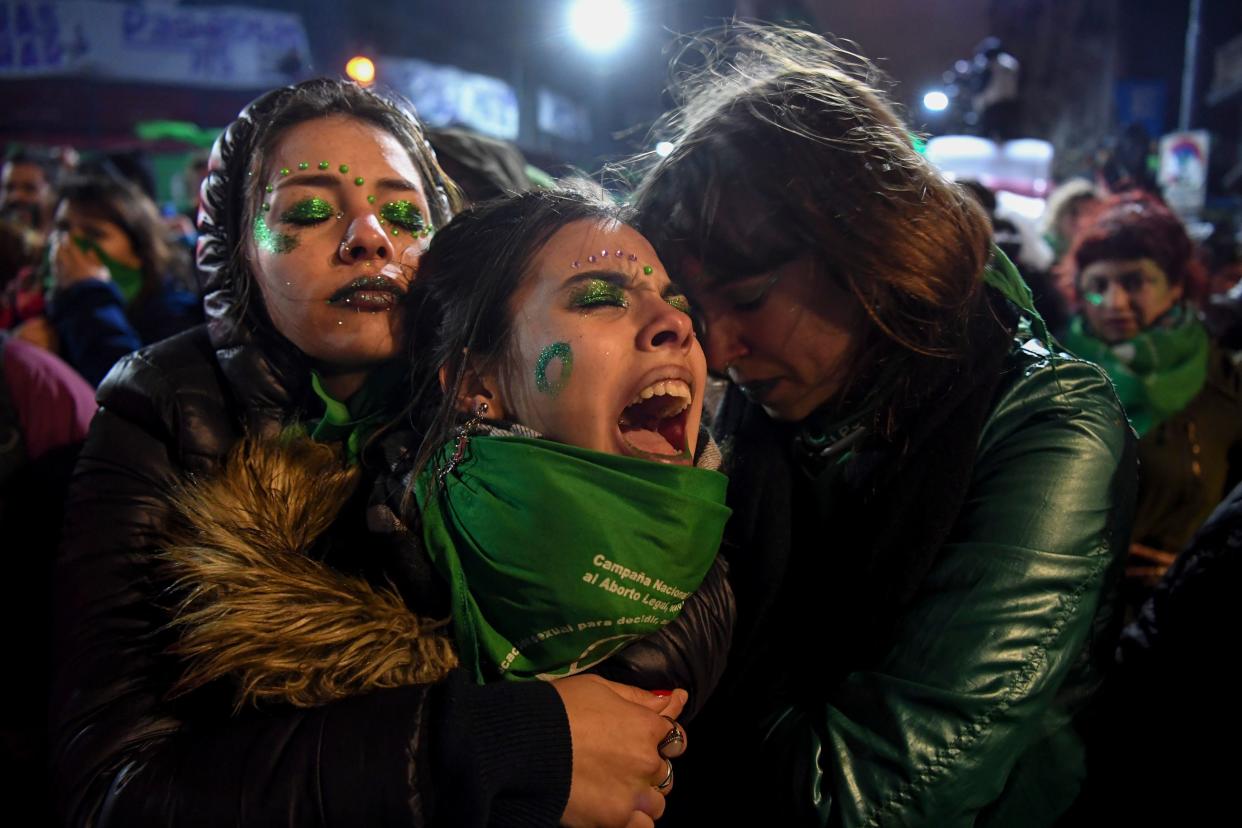Woman Dies From Botched DIY Abortion Days After Argentina Rejects Abortion Bill

A 34-year-old woman reportedly died in Argentina this week after a botched DIY attempt to induce a miscarriage. It’s the first reported death linked to an illegal abortion in Argentina since the country’s Senate voted down a landmark abortion bill last week that sought to legalize the procedure.
The woman, identified only as Liz by local media, was admitted to a hospital on Sunday after suffering complications from an at-home abortion attempt. Doctors said the woman had tried to use parsley to induce a miscarriage, which caused a serious infection, reported Clarín, Argentina’s largest paper.
Her uterus was removed in the hopes of saving her but the woman, who is survived by a 2-year-old son and had endured two earlier illegal abortions, reportedly died the following day.
“This would never have happened if abortions were legal,” Sebastián Crespo of the Professionals Network for the Right to Decide, an Argentinian organization of health workers, told Clarín.
Crespo added that if abortion was allowed, women like Liz may not have to undergo multiple abortions because health centers would be able to provide improved health information and contraceptives.
Up to 500,000 illegal abortions are performed in Argentina every year, according to Sandra Hoyos, an organizer with the National Campaign for the Right to Legal, Safe, and Free Abortions.
“To get an abortion, we are forced into darkness, we have to put our own health and wellbeing at risk, we lose autonomy over our bodies and we cannot freely decide to give birth,” Hoyos said during a May conversation with the North American Congress on Latin America.
Argentina, like most other countries in Catholic-majority Latin America, has restrictive and punitive abortion laws. Abortions in the country are only allowed in cases of rape or when the mother is mentally disabled or her health is at risk. In all other cases, abortions are considered a criminal offense and can be punished with imprisonment.
Last week, however, Argentina’s Senate had an opportunity to change the law. They debated a groundbreaking bill on Wednesday that would have legalized abortion during the first 14 weeks of pregnancy.
The legislation ― which was fueled, in part, by a new women’s rights movement known as #NiUnaMenos ― had enjoyed considerable public support and had been narrowly approved in June by the country’s House.
The Senate, however, ultimately rejected the bill.
After more than 16 hours of deliberation, Argentina’s senate narrowly rejected a bill to legalize abortion. The vote gripped the nation as opposing camps fought to sway senators. We're in Argentina and spoke with people on both sides of the issue. https://t.co/wI1vwc9Gq7 pic.twitter.com/qeRO2b5yj6
— The New York Times (@nytimes) August 9, 2018
“After a marathon 16-hour debate, senators decided to reject a law that would have saved countless lives,” said Mariela Belski, executive director of Amnesty International Argentina, in a statement. “For now, people who need to terminate pregnancies in Argentina will have to continue to risk death or incarceration.”
Still, Belski stressed that the Senate vote was a “stepping stone” and “not a setback” for Argentinians’ abortion rights.
“Something has irrevocably changed,” she wrote. “That night, hundreds of thousands of people, mostly women, stood together in the streets outside the Senate in Buenos Aires” as the vote was taking place.
“That mass gathering was momentous. It showed that the stigma, shame and secrecy that have surrounded abortion for so long are disintegrating,” Belski added.
This week, following the news of Liz’s death, hundreds of protesters have taken to the streets of Argentina once more to call for reproductive rights ― and for the lawmakers who voted against the abortion bill to be held accountable for the woman’s death.
Pañuelazo y corte frente al Hospital de Pacheco @izquierdadiario#ElSenadoEsResponsable de la muerte de Liz. #AbortoLegalYa pic.twitter.com/5nTRZ5zK3Z
— Rodrigo Lescano (@Lescano559) August 14, 2018
In a statement, the National Campaign for the Right to Legal, Safe, and Free Abortions said every death from an abortion will now be the responsibility of the “National Executive Power and the 40 senators who abstained or voted against our right to life, to health and the recognition of our dignity.”
Hoy una mujer murió en el conurbano bonaerense por un aborto clandestino #ElSenadoEsResponsable por no haber votado a favor de una ley que salva vidas. #AbortoLegalEsVida@SenadoArgentina
Volvemos a compartir la declaración con los errores corregidos. pic.twitter.com/oah8GI9zKL— #SeguimosEnCampaña💚💜 (@CampAbortoLegal) August 14, 2018
Lee Moran contributed reporting.
Love HuffPost? Become a founding member of HuffPost Plus today.
Also on HuffPost
This article originally appeared on HuffPost.

